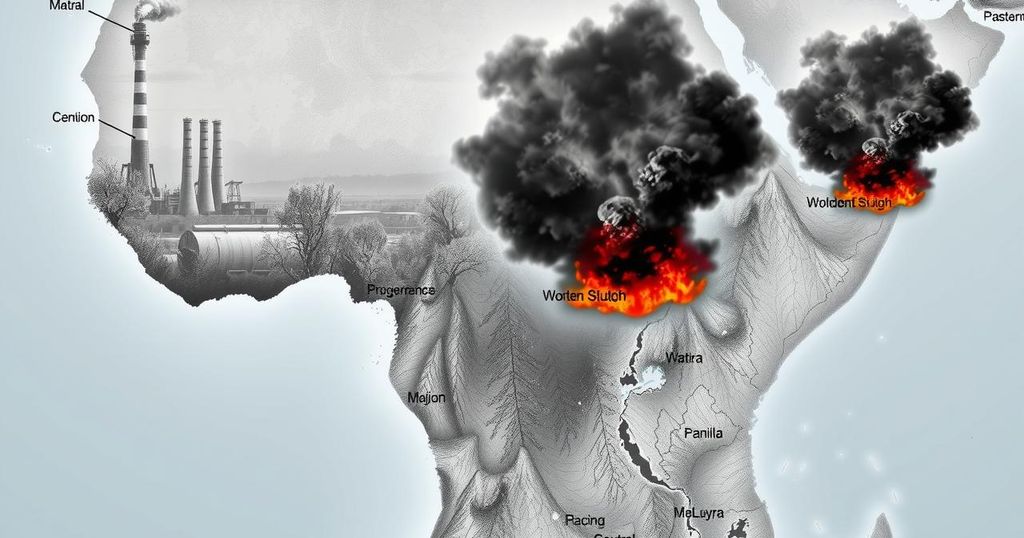Ghana and Africa Face Severe Air Pollution Crisis, Report Reveals
The 2024 World Air Quality Report highlights Ghana, Nigeria, Chad, and Rwanda among the most polluted countries. Chad has the highest PM2.5 concentration, significantly surpassing WHO guidelines. Ghana’s air pollution has worsened markedly over the years, raising urgent calls for government intervention to address public health and economic risks associated with pollution.
The 2024 World Air Quality Report reveals that Ghana, Nigeria, Chad, and Rwanda are among the most polluted countries globally, highlighting a grave air quality crisis threatening millions. Chad leads with a PM2.5 concentration of 91.8 µg/m³, significantly exceeding the World Health Organization’s (WHO) safe limit. Nigeria, Rwanda, and Ghana follow, with PM2.5 levels of 40.1 µg/m³, 40.8 µg/m³, and 35.8 µg/m³, respectively.
PM2.5 particles pose severe health risks as they penetrate deep into the lungs, increasing the chances of respiratory and cardiovascular diseases. In polluted areas, air quality reductions translate to a 2.7-year decrease in lifespan according to research from the University of Chicago’s Air Quality Life Index (AQLI). In Ghana, air pollution is responsible for approximately 28,000 fatalities each year.
Ghana’s air pollution levels are alarmingly high, with the capital, Accra, ranking as the 16th most polluted city globally, followed by Kumasi, which has emerged as the most polluted city in the country. Ghana’s pollution rates have escalated dramatically since 2022, increasing from 27th to 14th place in global rankings within two years.
The report notes that Africa features five of the top ten most polluted countries, indicating a significant challenge in air quality management across the continent. Only 24 out of 54 countries reported air quality data, exposing significant gaps in monitoring infrastructure. Furthermore, the lack of pollution data from major urban centers, such as Lagos, raises concerns about the adequacy of air quality assessments in Africa.
The ongoing air pollution crisis in Ghana necessitates urgent attention, as it poses severe public health risks. WHO estimates suggest 28,000 deaths annually due to air pollution in Ghana, which emphasizes the need for immediate interventions. The economic impact is also considerable, with predictions estimating costs could reach $137.8 billion by 2040.
Globally, only 17% of cities meet the WHO air pollution guidelines; however, clean air is still achievable in some regions, particularly in countries like Australia, Iceland, and New Zealand. Notably, in Africa, the town of Nieuwoudtville in South Africa is the sole location meeting WHO standards.
Key drivers of Africa’s air pollution include urbanization, rising populations, industrial emissions, and uncontrolled burning of waste. The report also notes a significant increase in air quality data collected by non-governmental organizations, which reflects the need for enhanced government-led initiatives.
Amid this critical situation, experts urge the Ghanaian government to implement stricter environmental policies, including improved vehicle emissions regulations, investment in renewable energy, expanded monitoring stations, and stringent regulations against burning pollutants. Immediate action is paramount to curtail the ongoing air quality deterioration affecting public health and economic stability in Ghana and Africa as a whole.
In conclusion, the 2024 World Air Quality Report underscores the critical air pollution crisis facing Ghana and several other African countries. With severe implications for public health and economic stability, particularly evident in the alarming PM2.5 levels, it is essential for policymakers to enforce stricter environmental regulations and increase investment in clean air initiatives. If decisive action is not undertaken promptly, the consequences of air pollution could exacerbate, leading to further health and economic ramifications.
Original Source: www.myjoyonline.com




Post Comment